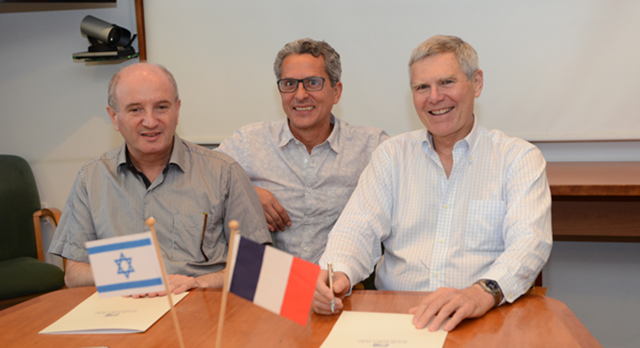
(l-r) Weizmann Institute of Science President Prof. Daniel Zajfman, Prof. Victor Malka, and École Polytechnique President Jacques Biot
Jacques Biot, President of École Polytechnique (Palaiseau, France), and Prof. Daniel Zajfman, President of the Weizmann Institute of Science (Rehovot, Israel), signed a cooperation agreement to develop and promote collaboration in higher education and research between the two institutions.
With this agreement, École Polytechnique and the Weizmann Institute of Science, both renowned for their high standards of quality in academics and research, seek to promote the exchange of students and faculty members, as well as to foster scientific and academic cooperation in topics of common interest.
A laboratory-initiated collaboration
Prof. Victor Malka, Research Director at the Laboratory of Applied Optics – a joint laboratory of École Polytechnique, École Nationale Supérieure de Techniques Avancées (ENSTA) ParisTech, and the Centre National de la Recherche Scientifique (CNRS) – joined the Department of Physics of Complex Systems of the Weizmann Institute of Science in October 2015. Prof. Malka is committed to bringing École Polytechnique and the Weizmann Institute closer: “It felt natural to me to initiate this collaboration, to create scientific cooperation. Both presidents − of Polytechnique and the Weizmann Institute of Science − have fully endorsed this initiative, enabling its quick success.”
Prof. Malka’s research deals with laser-plasma accelerators. This accelerator concept, invented 30 years ago, has enabled researchers to obtain particle beams with unique properties. Very energetic, extremely bright, and tunable in energy, these beams open new opportunities in such diverse fields such as medicine, chemistry, biology, and materials science.
Recent improvements at the Laboratory of Applied Optics have opened the path to treating cancerous tumors. Research projects in this lab have yielded new perspectives; for example, on the detection of breast cancerous tumors at a very early stage. This new laser-plasma technology can also be used for industrial applications, as it produces high-resolution, three-dimensional images of dense materials, such as those used in airplane parts.
Prof. Malka is currently working towards an association between the Laboratory of Applied Optics and the Weizmann Institute’s Faculty of Physics to develop applications for laser-plasma accelerators. Under his initiative, two students from Weizmann have already started PhD research at the Laboratory of Applied Optics.
The Weizmann Institute of Science in Rehovot, Israel, is one of the world’s top-ranking multidisciplinary research institutions. Noted for its wide-ranging exploration of the natural and exact sciences, the Institute is home to 3,800 scientists, students, technicians, and supporting staff. Institute research efforts include the search for new ways of fighting disease and hunger, examining leading questions in mathematics and computer science, probing the physics of matter and the universe, creating novel materials, and developing new strategies for protecting the environment.
École Polytechnique is a leading French institute which combines top-level research, academics, and innovation at the cutting-edge of science and technology. Its various graduate-level programs – Ingénieur Polytechnicien, Master’s, Graduate Degree, PhD track, and PhD – are highly selective and promote a culture of excellence with a strong emphasis on science, anchored in humanist traditions. As a widely internationalized university, École Polytechnique offers a variety of international programs and attracts a growing number of foreign students and researchers from around the globe (currently 30% of students and 39% of faculty members).
